Leads
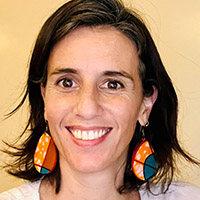 Clara Delavallade is a Senior Economist at the Africa Gender Innovation Lab where she leads the research agendas on social protection, socio-emotional skills and climate change. She conducts research and informs policy on what works (and what doesn’t) to empower women in Sub-Saharan Africa. Her areas of interest are in education and health, as well as human capital formation and drivers of motivation (socio-emotional skills, aspirations, mental health and workplace incentives) and their role in economic development and service delivery to the poor, especially women. Her research also delves into risk management and technology adoption among poor farmers (inventory credit, post-harvest technologies and weather insurance). Prior to joining the World Bank, Clara was Executive Director at J-PAL South Asia, Associate Professor of Economics at the University of Cape Town and Research Fellow at IFPRI. She holds a Ph.D. from University Paris 1 Sorbonne / Paris School of Economics.
Clara Delavallade is a Senior Economist at the Africa Gender Innovation Lab where she leads the research agendas on social protection, socio-emotional skills and climate change. She conducts research and informs policy on what works (and what doesn’t) to empower women in Sub-Saharan Africa. Her areas of interest are in education and health, as well as human capital formation and drivers of motivation (socio-emotional skills, aspirations, mental health and workplace incentives) and their role in economic development and service delivery to the poor, especially women. Her research also delves into risk management and technology adoption among poor farmers (inventory credit, post-harvest technologies and weather insurance). Prior to joining the World Bank, Clara was Executive Director at J-PAL South Asia, Associate Professor of Economics at the University of Cape Town and Research Fellow at IFPRI. She holds a Ph.D. from University Paris 1 Sorbonne / Paris School of Economics.
Smita Das is a Program Manager at Innovations for Poverty Action and a Consultant at the World Bank Africa Gender Innovation Lab. She has over ten years of experience running impact evaluations related to women’s economic empowerment. She is particularly interested in implementation-focused research. Since 2019, she has been deeply involved in examining the relationship between soft skills and economic outcomes, measuring soft skills, and designing training programs. Before that, she was a research fellow at Evidence for Policy Action at the Harvard Kennedy School, and ran programs addressing the foreclosure crisis in Boston and the wages of domestic workers in India. She earned a Masters in Economics from Boston College and a Bachelors in Mathematical Economic and Public Policy from Rice University.
Researchers
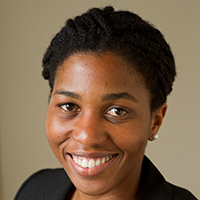
Kehinde Ajayi is a senior fellow at the Center for Global Development and director of CGD’s gender equality and inclusion program. Previously, Ajayi coordinated research initiatives on women’s economic empowerment, youth employment, social protection, and childcare in the World Bank’s Africa Gender Innovation Lab. Before joining the World Bank, she was an assistant professor of economics at Boston University, a visiting assistant professor of economics at Duke University, a faculty research fellow of the National Bureau of Economic Research, and a Fulbright fellow in Nigeria. She holds a PhD in economics from the University of California, Berkeley and a BA in economics from Stanford University.
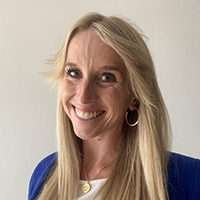 Rachel Cassidy is a (senior) economist specialized in development impact evaluation at the International Finance Corporation, within the World Bank Group. She was previously an economist at the World Bank's Africa Gender Innovation Lab. Her research focuses on using randomized experiments to study questions and innovations related to international development, with a focus on women and on the private sector. She has published in academic journals including the Journal of Development Economics, and the Proceedings of the National Academy of Science. In her personal research capacity, she is a non-resident fellow at the Center for Global Development, an international research associate at the Institute for Fiscal Studies, a research associate at the University of Warwick's CAGE Research Centre, and an affiliate of the University of Oxford's Centre for the Study of African Economies. She received her PhD from the Department of Economics at the University of Oxford, where she also taught on the Said Business School's MBA program, and completed part of her PhD at Stanford University.
Rachel Cassidy is a (senior) economist specialized in development impact evaluation at the International Finance Corporation, within the World Bank Group. She was previously an economist at the World Bank's Africa Gender Innovation Lab. Her research focuses on using randomized experiments to study questions and innovations related to international development, with a focus on women and on the private sector. She has published in academic journals including the Journal of Development Economics, and the Proceedings of the National Academy of Science. In her personal research capacity, she is a non-resident fellow at the Center for Global Development, an international research associate at the Institute for Fiscal Studies, a research associate at the University of Warwick's CAGE Research Centre, and an affiliate of the University of Oxford's Centre for the Study of African Economies. She received her PhD from the Department of Economics at the University of Oxford, where she also taught on the Said Business School's MBA program, and completed part of her PhD at Stanford University.
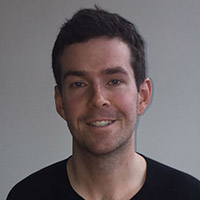 Aidan Clerkin is a Research Fellow at Ireland’s Educational Research Centre and a consultant for the World Bank and IPA. With a background in psychology, his work includes national and international large-scale assessments of education, programme evaluation, and research including longitudinal study of socioemotional development in adolescence. In Ireland and internationally, he advises on the design of research studies and large-scale assessments, analyses and interprets research to inform policymaking, and contributes to capacity-building workshops. His research interests include socioemotional development, wellbeing, and the promotion of positive development; student engagement; intervention and programme evaluations, and longitudinal research methods.
Aidan Clerkin is a Research Fellow at Ireland’s Educational Research Centre and a consultant for the World Bank and IPA. With a background in psychology, his work includes national and international large-scale assessments of education, programme evaluation, and research including longitudinal study of socioemotional development in adolescence. In Ireland and internationally, he advises on the design of research studies and large-scale assessments, analyses and interprets research to inform policymaking, and contributes to capacity-building workshops. His research interests include socioemotional development, wellbeing, and the promotion of positive development; student engagement; intervention and programme evaluations, and longitudinal research methods.
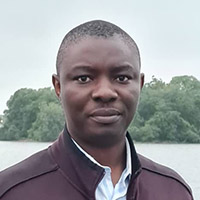 Ayodele Fashogbon is an Economist at the World Bank’s Africa Gender Innovation Lab where he leads research on innovative and scalable solutions to boost women’s agricultural productivity, earnings from entrepreneurship and livelihoods, employment of youth and women’s economic empowerment. He currently leads the Nigeria Gender Innovation Lab’s engagement strategy on using evidence to drive women’s economic empowerment in policies and programming. His current research interests include using various rigorous impact evaluation approaches to evaluate and understand interventions that work to promote women’s economic empowerment, and he is especially keen on understanding how value chain financing through anchors, socioemotional skills, livelihood graduation programs and digital credit access work to improve earnings for entrepreneurs. He holds a PhD in Agricultural Economics from the University of Fort Hare, South Africa.
Ayodele Fashogbon is an Economist at the World Bank’s Africa Gender Innovation Lab where he leads research on innovative and scalable solutions to boost women’s agricultural productivity, earnings from entrepreneurship and livelihoods, employment of youth and women’s economic empowerment. He currently leads the Nigeria Gender Innovation Lab’s engagement strategy on using evidence to drive women’s economic empowerment in policies and programming. His current research interests include using various rigorous impact evaluation approaches to evaluate and understand interventions that work to promote women’s economic empowerment, and he is especially keen on understanding how value chain financing through anchors, socioemotional skills, livelihood graduation programs and digital credit access work to improve earnings for entrepreneurs. He holds a PhD in Agricultural Economics from the University of Fort Hare, South Africa.
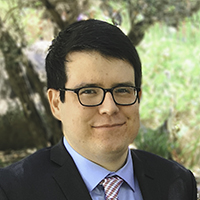 Christopher Gonzales is a Research Assistant Professor as part of the Early Learning Systems Initiative (ELSI) in the College of Health at Oregon State University. He received his PhD from Arizona State University in 2018 in developmental psychology and his research covers broad areas of cognitive and social development including self-regulation, executive functioning, and social understanding with a focus on quantitative analyses and psychometrics.
Christopher Gonzales is a Research Assistant Professor as part of the Early Learning Systems Initiative (ELSI) in the College of Health at Oregon State University. He received his PhD from Arizona State University in 2018 in developmental psychology and his research covers broad areas of cognitive and social development including self-regulation, executive functioning, and social understanding with a focus on quantitative analyses and psychometrics.
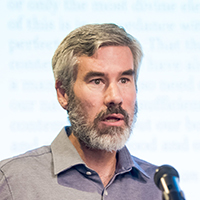 Julian Jamison is Professor of Economics at the University of Exeter and Research Fellow at Oxford's Global Priorities Institute. Julian’s research focuses on preferences, decisions, and well-being, interacted with institutional policies; he has a special interest in explicit welfare tradeoffs and normative inputs to policy. He uses a range of methodologies, from theory to experiments to surveys to large datasets. Much of his field work has been in sub-Saharan Africa, and he has traveled to almost 100 countries. Julian’s work has been published in leading academic journals in disciplines from economics to philosophy to IT to medicine.
Julian Jamison is Professor of Economics at the University of Exeter and Research Fellow at Oxford's Global Priorities Institute. Julian’s research focuses on preferences, decisions, and well-being, interacted with institutional policies; he has a special interest in explicit welfare tradeoffs and normative inputs to policy. He uses a range of methodologies, from theory to experiments to surveys to large datasets. Much of his field work has been in sub-Saharan Africa, and he has traveled to almost 100 countries. Julian’s work has been published in leading academic journals in disciplines from economics to philosophy to IT to medicine.
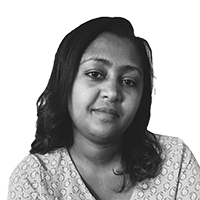 Tigist Assefa Ketema is an Analyst at the World Bank’s Africa Gender Innovation Lab. She currently works on evaluating the impact of agriculture, private sector development, and socioemotional skills programs on women’s economic empowerment. Her work aims to address economic gender inequality in Sub-Saharan Africa by providing evidence-based policy recommendations to policymakers and program implementers. Before joining the World Bank, Tigist was an Assistant Lecturer at Bahir Dar University in Ethiopia, where she taught economics courses. She holds an MA in Comparative Local Development from the University of Trento, and an MSc in Economics from Addis Ababa University.
Tigist Assefa Ketema is an Analyst at the World Bank’s Africa Gender Innovation Lab. She currently works on evaluating the impact of agriculture, private sector development, and socioemotional skills programs on women’s economic empowerment. Her work aims to address economic gender inequality in Sub-Saharan Africa by providing evidence-based policy recommendations to policymakers and program implementers. Before joining the World Bank, Tigist was an Assistant Lecturer at Bahir Dar University in Ethiopia, where she taught economics courses. She holds an MA in Comparative Local Development from the University of Trento, and an MSc in Economics from Addis Ababa University.
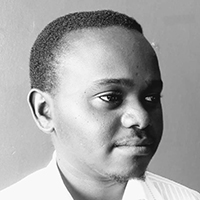 Elijah Kipchumba is a PhD candidate at Trinity College Dublin. As part of his PhD candidature, his research centers on youth upskilling programs and interventions addressing social and economic inclusion for persons with disabilities. His research interests broadly relate to economics of household, gender and labour. He earned his MSc in Quantitative Economics from Makerere University and hold a BSc in Applied Statistics from Maseno University. Elijah has eight years of development research experience, having previously worked as a research associate at BRAC International and Save the Children International in the East African region.
Elijah Kipchumba is a PhD candidate at Trinity College Dublin. As part of his PhD candidature, his research centers on youth upskilling programs and interventions addressing social and economic inclusion for persons with disabilities. His research interests broadly relate to economics of household, gender and labour. He earned his MSc in Quantitative Economics from Makerere University and hold a BSc in Applied Statistics from Maseno University. Elijah has eight years of development research experience, having previously worked as a research associate at BRAC International and Save the Children International in the East African region.
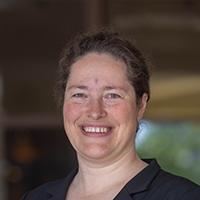 Tricia Koroknay-Palicz is a World Bank Economist. She works mainly on interventions and studies focused on increasing productivity and incomes in Sub-Saharan Africa; gender and intra-household dynamics; financial inclusion; and post-conflict recovery. She previously worked at Innovations for Poverty Action, and MIT’s Jameel Poverty Action Lab. She holds a Master’s degree from Princeton University.
Tricia Koroknay-Palicz is a World Bank Economist. She works mainly on interventions and studies focused on increasing productivity and incomes in Sub-Saharan Africa; gender and intra-household dynamics; financial inclusion; and post-conflict recovery. She previously worked at Innovations for Poverty Action, and MIT’s Jameel Poverty Action Lab. She holds a Master’s degree from Princeton University.
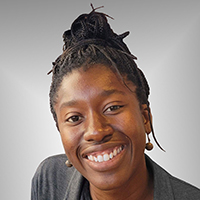 Estelle Koussoubé is a senior economist in the World Bank’s Africa Region Gender Innovation Lab, where she leads the research agenda on youth employment and adolescent girls’ empowerment. She currently works on impact evaluations of adolescent girls’ and women’s empowerment programs and on youth employment programs, as well as on agriculture and gender-based violence prevention programs in Sub-Saharan Africa, to inform the design and implementation of effective programs and policies to reduce gender inequality. Before joining the World Bank, Koussoubé was a junior research fellow at the French National Research Institute for Sustainable Development and Paris-Dauphine University, where she worked on the Nopoor Project. She holds a PhD in economics from Paris-Dauphine University.
Estelle Koussoubé is a senior economist in the World Bank’s Africa Region Gender Innovation Lab, where she leads the research agenda on youth employment and adolescent girls’ empowerment. She currently works on impact evaluations of adolescent girls’ and women’s empowerment programs and on youth employment programs, as well as on agriculture and gender-based violence prevention programs in Sub-Saharan Africa, to inform the design and implementation of effective programs and policies to reduce gender inequality. Before joining the World Bank, Koussoubé was a junior research fellow at the French National Research Institute for Sustainable Development and Paris-Dauphine University, where she worked on the Nopoor Project. She holds a PhD in economics from Paris-Dauphine University.
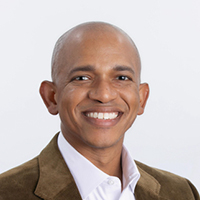 Victor Marsh completed his doctorate in Organizational Behavior at the University of Colorado in May 2021. Before pursuing doctoral study, he was a U.S. diplomat posted to Cyprus, Hong Kong & Macau, and the Secretary of State’s headquarters team. After working inside the U.S. federal government’s bureaucracy, Vic is now a scholar of politics in organizations. Specifically, Vic is interested in the impact of change agents' skills on organizational leaders' decisions.
Victor Marsh completed his doctorate in Organizational Behavior at the University of Colorado in May 2021. Before pursuing doctoral study, he was a U.S. diplomat posted to Cyprus, Hong Kong & Macau, and the Secretary of State’s headquarters team. After working inside the U.S. federal government’s bureaucracy, Vic is now a scholar of politics in organizations. Specifically, Vic is interested in the impact of change agents' skills on organizational leaders' decisions.
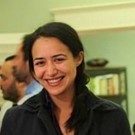 Dawn McDaniel is the Associate Director of Research and Development at PEAR and Lecturer on Psychology and Harvard Medical Center. She received her Ph.D. in Child Clinical Psychology from the University of Southern California and completed a fellowship in Applied Epidemiology at the Centers for Disease Control and Prevention (CDC). She has published on topics related to evidence- based interventions, mental health, youth development and measurement development. Dawn is interested in ways that best practices from research can be translated into scalable interventions and meaningful youth outcomes.
Dawn McDaniel is the Associate Director of Research and Development at PEAR and Lecturer on Psychology and Harvard Medical Center. She received her Ph.D. in Child Clinical Psychology from the University of Southern California and completed a fellowship in Applied Epidemiology at the Centers for Disease Control and Prevention (CDC). She has published on topics related to evidence- based interventions, mental health, youth development and measurement development. Dawn is interested in ways that best practices from research can be translated into scalable interventions and meaningful youth outcomes.
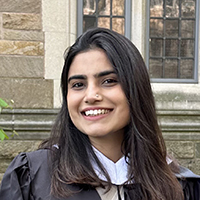 Garima Nain is a Research Analyst at Innovations for Poverty Action, where she works on the APPEALS project in collaboration with the World Bank Gender Innovation Lab in Nigeria. Previously, she was a Research Fellow at the National Institute of Public Finance and Policy, the think tank for India's Ministry of Finance. Garima holds a master's degree in International and Development Economics from Yale University. Passionate about using research to shape policy, she has experience conducting impact evaluations and addressing development challenges across sectors like gender, healthcare, and infrastructure.
Garima Nain is a Research Analyst at Innovations for Poverty Action, where she works on the APPEALS project in collaboration with the World Bank Gender Innovation Lab in Nigeria. Previously, she was a Research Fellow at the National Institute of Public Finance and Policy, the think tank for India's Ministry of Finance. Garima holds a master's degree in International and Development Economics from Yale University. Passionate about using research to shape policy, she has experience conducting impact evaluations and addressing development challenges across sectors like gender, healthcare, and infrastructure.
Sreelakshmi Papineni is an Economist in the World Bank’s Africa Gender Innovation Lab. She coordinates a portfolio of impact evaluations across several sectors including entrepreneurship, agriculture, and adolescent girls. Her research interest primarily focuses on the role of social norms and social influences in shaping economic decisions. She also leads a thematic work program on entrepreneurship and occupational sex segregation. Her work informs the design of programs and policies to promote women’s economic empowerment across Sub-Saharan Africa. Before joining the World Bank, Sreelakshmi was a Research Fellow at Harvard’s Evidence for Policy Design, a field-based Research Analyst for Innovations for Poverty Action in Nairobi, Kenya, and Centre for Microfinance in Kolkata, India, and an Equity Sales Trader in an investment bank in London, UK. Sreelakshmi holds degrees from Yale University and University College London (UCL).
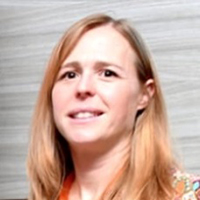 Léa Rouanet is a Senior Economist working at the World Bank, where she is the Deputy Head of the Africa Gender Innovation Lab. As such, she leads the conceptualization and execution of the research uptake strategy of the Lab. She also leads several impact evaluations aiming to identify and address gender-based constraints to economic activity in sub-Saharan Africa, with a focus on adolescent girls’ empowerment and skills development programs. Before joining the World Bank, she was a PhD candidate and Research Fellow at the Paris School of Economics (PSE), where her research focused on nutrition, child mortality, fertility, and gender preferences in Africa. She holds a PhD in Economics from PSE.
Léa Rouanet is a Senior Economist working at the World Bank, where she is the Deputy Head of the Africa Gender Innovation Lab. As such, she leads the conceptualization and execution of the research uptake strategy of the Lab. She also leads several impact evaluations aiming to identify and address gender-based constraints to economic activity in sub-Saharan Africa, with a focus on adolescent girls’ empowerment and skills development programs. Before joining the World Bank, she was a PhD candidate and Research Fellow at the Paris School of Economics (PSE), where her research focused on nutrition, child mortality, fertility, and gender preferences in Africa. She holds a PhD in Economics from PSE.
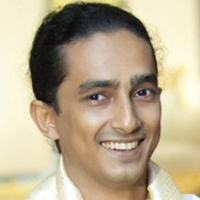 Munshi Sulaiman is the Director of Research at the BRAC Institute of Governance and Development (BIGD), Brac University, and serves as an advisor for The Agency Fund. His research career began at BRAC's Research and Evaluation Division (RED) in 2004. Prof. Sulaiman has held leadership roles, including Research Director at Save the Children and Innovation for Poverty Action. He earned his PhD in Economics from the London School of Economics (LSE) and was a Post-Doctoral Fellow at Yale University. His published work focuses on poverty, financial inclusion, and labor markets, with contributions to leading economics journals.
Munshi Sulaiman is the Director of Research at the BRAC Institute of Governance and Development (BIGD), Brac University, and serves as an advisor for The Agency Fund. His research career began at BRAC's Research and Evaluation Division (RED) in 2004. Prof. Sulaiman has held leadership roles, including Research Director at Save the Children and Innovation for Poverty Action. He earned his PhD in Economics from the London School of Economics (LSE) and was a Post-Doctoral Fellow at Yale University. His published work focuses on poverty, financial inclusion, and labor markets, with contributions to leading economics journals.












